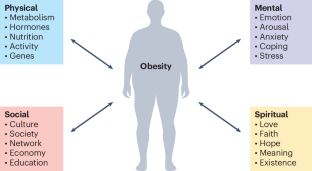解释和对抗肥胖的整体方法
IF 18.9
1区 医学
Q1 ENDOCRINOLOGY & METABOLISM
引用次数: 0
摘要
肥胖是一个与西方生活方式有关的全球性健康问题。生活方式是生物学的,但也是非生物学的,因此需要的不仅仅是饮食、运动和细胞代谢机制的研究。Magkos等人最近的观点1提供了代谢性肥胖研究的主要因果模型和未来探索的新领域的优秀概述。具体来说,他们对比了能量平衡模型(EBM)和碳水化合物-胰岛素模型(CIM)。后者可以被认为是燃料分配模型(FPM)的一个版本2。我们提请注意,需要整体的、跨学科的方法,以及潜在的新的本体论观点,来解释和对抗肥胖,而不是目前在现有的生物学模型中考虑的问题。1946年,世界卫生组织将健康定义为“……身体、精神和社会的全面健康”,这就指出了对健康的整体理解。在过去的几十年里,灵性被认为是人类健康必不可少的第四个维度。尽管Magkos等人在他们的模型中包括了“其他因素”中的“社会心理因素”,但他们几乎没有讨论心理或社会因素,而忽略了灵性因素。根据姑息治疗的经验,灵性被广泛定义为“人类的动态和内在方面,人们通过它寻求终极意义、目的和超越,体验与自我、家庭、他人、社区、社会、自然和重要或神圣的关系。”灵性是通过信仰、价值观、传统和实践来表达的。”最近的流行病学研究表明,精神状态与健康状况之间存在密切联系。这种关系很难完全用新陈代谢的改变或社会心理因素来解释,而观察到的影响可能部分取决于精神的独立影响。全球大多数人口以某种形式(精神、宗教、世俗和/或存在主义)表达信仰信念6,7,8。精神的需要和表达是普遍的,包括在现代的世俗文化中。因此,个人或集体的精神可能会影响人们对自己的身体、食物和饮食的理解和联系。除了社会心理问题,存在焦虑可能会刺激食欲和脂肪储存,这与传统的循证医学和FPM理论一致。本文章由计算机程序翻译,如有差异,请以英文原文为准。


Holistic approaches to explain and combat obesity
求助全文
通过发布文献求助,成功后即可免费获取论文全文。
去求助
来源期刊

Nature metabolism
ENDOCRINOLOGY & METABOLISM-
CiteScore
27.50
自引率
2.40%
发文量
170
期刊介绍:
Nature Metabolism is a peer-reviewed scientific journal that covers a broad range of topics in metabolism research. It aims to advance the understanding of metabolic and homeostatic processes at a cellular and physiological level. The journal publishes research from various fields, including fundamental cell biology, basic biomedical and translational research, and integrative physiology. It focuses on how cellular metabolism affects cellular function, the physiology and homeostasis of organs and tissues, and the regulation of organismal energy homeostasis. It also investigates the molecular pathophysiology of metabolic diseases such as diabetes and obesity, as well as their treatment. Nature Metabolism follows the standards of other Nature-branded journals, with a dedicated team of professional editors, rigorous peer-review process, high standards of copy-editing and production, swift publication, and editorial independence. The journal has a high impact factor, has a certain influence in the international area, and is deeply concerned and cited by the majority of scholars.
 求助内容:
求助内容: 应助结果提醒方式:
应助结果提醒方式:


